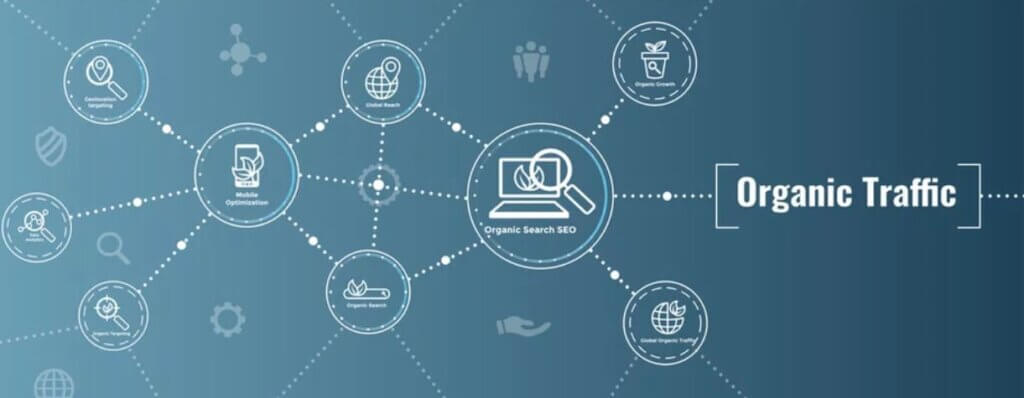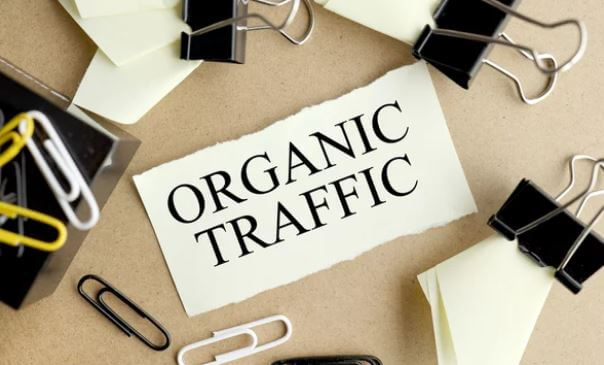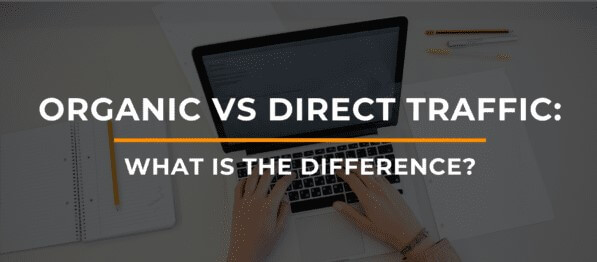Organic Traffic
Introduction
Organic traffic is a term that refers to the visitors who arrive on your website from search engine results pages (SERPs) without any paid advertising or promotions. In other words, organic traffic is the traffic that you get naturally, without any extra effort or cost. Organic traffic is considered a website’s most valuable traffic source because it represents a high level of intent and interest from potential customers.
Importance of Organic Traffic
Organic traffic is an essential part of a successful digital marketing strategy. Here are some reasons why organic traffic is so important:
- It’s Cost-Effective: Organic traffic is free, so you don’t have to pay for every click or impression. This makes it a very cost-effective way to drive traffic to your website.
- It Builds Trust: Visitors who arrive at your website through organic search are often more likely to trust your website than those who come through paid advertising. They perceive your website as more authoritative and trustworthy since it ranks highly in search engine results.
- It’s Long-Lasting: Organic traffic is a sustainable traffic source that continues bringing visitors to your website over time, even after you have stopped actively promoting it.
Understanding Organic Traffic
Organic traffic comes to your website from search engines like Google, Bing, and Yahoo. It is generated by search engine users who type keywords related to your website’s content and find your website in the search results. Understanding organic traffic is essential for any website owner or a digital marketer who wants to build a successful online presence.
What is Organic Traffic?
Organic traffic comes to your website from search engine results pages (SERPs) without paid advertising or promotions. In other words, organic traffic is the traffic that you get naturally, without any extra effort or cost. Organic traffic is considered a website’s most valuable traffic source because it represents a high level of intent and interest from potential customers.
How Organic Traffic Differs from Other Traffic Sources
Organic traffic differs from other traffic sources because it is accessible, targeted, and sustainable. Here are some of the key differences:
- Paid Traffic: Paid traffic is generated by paid advertising campaigns, where you pay for each click or impression. This traffic is often less targeted and less sustainable than organic traffic.
- Social Traffic: Social traffic is generated by social media platforms like Facebook, Twitter, and LinkedIn. This traffic is often less targeted than organic traffic since it’s not based on search intent.
Why Organic Traffic is Valuable
Organic traffic is valuable for several reasons:
- High Conversion Rates: Organic traffic has a higher conversion rate than other traffic sources since it’s highly targeted.
- Sustainable Traffic: Organic traffic generation continues to bring visitors to your website over time, even after you have stopped actively promoting your website.
- Cost-Effective: Organic traffic is free, so you don’t have to pay for every click or impression.
Factors that Impact Organic Traffic
Several factors impact the amount of organic traffic your website receives. These factors include:
- Keyword Relevance: The relevance of the keywords you target and how well they match search intent.
- On-Page Optimization: The quality of your website’s content, structure, and HTML tags.
- Backlinks: The number and quality of external websites linking to your website.
- User Experience: The overall user experience of your website, including site speed, mobile responsiveness, and usability.
- Local SEO: Your website’s visibility in local search results, including Google Maps and other location-based services.
- Keyword Relevance: Keyword relevance refers to using relevant keywords in your website’s content. This means researching and targeting keywords your target audience is searching for and optimizing your website’s content to match those keywords. Keyword relevance is essential for ranking higher in search engine results pages (SERPs) and attracting more organic traffic.
On-Page Optimization:
On-page optimization involves improving your website’s content, structure, and HTML tags to make it more visible and relevant to search engines. This includes optimizing page titles, meta descriptions, header tags, and body content to include relevant keywords and provide a better user experience.
Backlinks
Backlinks are links from external websites that point to your website. Your number and quality of backlinks can impact your website’s authority and visibility in search engine results. High-quality backlinks from authoritative websites can help you rank higher in search results and drive more organic traffic to your website.
User Experience
User experience (UX) is a user’s overall experience while visiting your website. This includes factors like site speed, mobile responsiveness, and usability. A positive user experience can help your website rank higher in search results and attract more organic traffic.
Local SEO
Local SEO is the process of optimizing your website for local search results.
Strategies for Boosting Organic Traffic:
If you want to increase the organic traffic to your website, there are several strategies you can use. Here are some of the most effective methods for boosting organic traffic:
Keyword Research
Keyword research identifies the keywords your target audience is searching for in search engines. You can optimize your website’s content and attract organic traffic by specifying keywords. Many tools are available to help with keyword research, including Google Keyword Planner, Ahrefs, and SEMrush.
On-Page Optimization
On-page optimization involves optimizing your website’s content and HTML tags to make it more visible and relevant to search engines. This includes optimizing page titles, meta descriptions, header tags, and body content to include relevant keywords and provide a better user experience. On-page optimization is essential for ranking higher in search engine results pages (SERPs) and attracting more organic traffic.
Content Creation
Creating high-quality content is one of the most effective ways to attract organic traffic to your website. By creating informative and engaging content your target audience is searching for, you can rank higher in search results and attract more organic traffic. When creating content, it’s essential to focus on quality over quantity and to include relevant keywords.
Backlink Building
Backlink building is acquiring links from other websites to your website. Backlinks are an essential ranking factor in search engine algorithms, and high-quality backlinks can help you rank higher in search results and attract more organic traffic. To build backlinks, you can contact other websites in your industry and ask for a link or create high-quality content that other websites will naturally link to.
Local SEO
Local SEO is the process of optimizing your website for local search results. This includes optimizing your website for Google Maps and other location-based services. You can optimize your Google My Business listing, get listed in local directories, and create local content to improve your local SEO.
Social Media
Social media can be a powerful tool for attracting organic traffic to your website. By sharing your content on social media, you can reach a wider audience and attract more visitors to your website. To be effective on social media, creating engaging content, posting consistently, and interacting with your audience is essential.
Guest Posting
Guest posting is creating content for other websites in your industry in exchange for a link back to your website. Guest posting can be an effective way to build backlinks, increase your visibility in your industry, and attract more organic traffic to your website.
Influencer Marketing
Influencer marketing involves partnering with influencers in your industry to promote your products or services. Influencers have a large following on social media and can help you reach a wider audience and attract more organic traffic to your website.
Video Marketing
Video marketing can be an effective way to attract more organic traffic to your website. By creating informative and engaging videos, you can rank higher in search results and attract more visitors to your website. Creating high-quality videos and optimizing them for search engines is essential for effective video marketing.
Conclusion
Boosting organic traffic to your website requires a combination of strategies, including keyword research, on-page optimization, content creation, backlink building, local SEO, social media, guest posting, influencer marketing, and video marketing. By implementing these strategies, you can improve your website’s visibility in search results and attract more organic traffic. Building organic traffic takes time and effort, but the results are worth it in the long run.
Measuring and Analyzing Organic Traffic:
Once you have implemented strategies to boost organic traffic to your website, measuring and analyzing the results is essential. Measuring and analyzing organic traffic can help you identify which methods are working and which need adjustment. Here are some key metrics to track when measuring and analyzing organic traffic:
Organic Traffic
Organic traffic is the number of visitors to your website that come from search engine results pages (SERPs) without clicking on paid ads. This is the most vital metric for measuring and analyzing organic traffic. You can track organic traffic using tools like Google Analytics or SEMrush.
Keyword Rankings
Keyword rankings are the positions your website ranks for in search engine results pages (SERPs) for specific keywords. Tracking your keyword rankings can help you identify which keywords drive the most organic traffic to your website and which need improvement. You can track keyword rankings using tools like Ahrefs or SEMrush.
Click-Through Rate (C.T.R.)
Click-through rate (C.T.R.) is the percentage of users who click on your website’s link in search engine results pages (SERPs). A high C.T.R. indicates that your website’s content is relevant and engaging to users. You can track your C.T.R. using tools like Google Search Console or SEMrush.
Bounce Rate
Bounce rate is the percentage of visitors who leave your website after viewing only one page. A high bounce rate indicates your website’s content is not engaging or relevant to users. You can track your bounce rate using tools like Google Analytics or SEMrush.
Conversion Rate
Conversion rate is the percentage of visitors who complete a desired action on your website, such as purchasing or filling out a form. Tracking your conversion rate can help you identify which pages on your website drive the most conversions and which need improvement. You can track your conversion rate using tools like Google Analytics or SEMrush.
Pages Per Session
Pages per session are the average number of pages visitors view during a single session on your website. Tracking pages per session can help you identify which pages on your website are the most engaging to users and which need improvement. You can track pages per session using tools like Google Analytics or SEMrush.
Time on Site
Time on site is the average time visitors spend on your website during a single session. Tracking time on organic site traffic can help you identify which pages on your website are the most engaging to users and which need improvement. You can track time on-site using tools like Google Analytics or SEMrush.
Referral Traffic
Referral traffic is the number of visitors to your website from other websites. Tracking referral traffic can help you identify which websites are linking to your website and which ones are driving the most traffic. You can track referral traffic using tools like Google Analytics or SEMrush.
Conclusion
Measuring and analyzing organic traffic is essential to optimizing your website’s performance in search engine results pages (SERPs). By tracking metrics like organic traffic, keyword rankings, click-through rate (C.T.R.), bounce rate, conversion rate, pages per session, time on site, and referral traffic, you can identify which strategies are working and which need improvement. With this data, you can make informed decisions about optimizing your website and attracting organic traffic. Remember, measuring and analyzing organic traffic is an ongoing process, and it’s essential to regularly review and adjust your strategies based on the data you collect.
Common Mistakes to Avoid When Boosting Organic Traffic:
When it comes to increasing organic traffic to your website, there are many different strategies to consider. However, you must be aware of common mistakes that undermine your efforts. Here are some common mistakes to avoid when trying to increase organic traffic:
Focusing Only on Keywords
While keywords are important for SEO, it’s important to remember that search engines seek quality, valuable content for their forest. Simply stuffing your content with keywords without regard for the quality of the content can hurt your rankings. Instead, focus on creating high-quality content that provides value to your target audience and naturally includes relevant keywords.
Neglecting On-Page Optimization
On-page optimization includes elements such as title tags, meta descriptions, and header tags, and it is crucial for search engines to understand the content on your website. Neglecting on-page optimization can hurt your website’s visibility in search results. Include relevant keywords in your title tags and meta descriptions, use header tags to structure your content, and ensure your website is mobile-friendly.
Ignoring Local SEO
If your business serves a local audience, it’s essential to focus on local SEO to attract potential customers in your area. Neglecting local SEO can make finding your business difficult for potential customers. Include your business’s name, address, and phone number (N.A.P.) on your website and online directories, and optimize your Google My Business listing.
Not Investing in Link Building
Links from other websites to your website are critical to search engine rankings. Neglecting link building can make it difficult for your website to rank well in search results. Invest in link building by contacting other websites in your industry and asking for links, creating high-quality content that other websites will want to link to, and listing your business in relevant online directories.
Neglecting Social Media
While social media doesn’t directly affect search engine rankings, it can be a valuable tool for driving traffic to your website. Neglecting social media can mean missing out on potential traffic and backlinks. Be sure to promote your content on social media platforms like Facebook, Twitter, and LinkedIn, and engage with your followers to build your brand’s visibility and credibility.
Overlooking Analytics
Measuring and analyzing your website’s traffic is essential for understanding which strategies are working and which need improvement. Neglecting analytics can mean missing out on valuable insights into your website’s performance. Regularly review your website’s analytics using tools like Google Analytics and use the data to adjust your strategies for increasing organic traffic.
Conclusion
Increasing organic traffic to your website takes time and effort, but avoiding common mistakes can help you achieve your goals more quickly and effectively. By focusing on quality content, optimizing your website for search engines, investing in local SEO and link building, promoting your content on social media, and regularly reviewing your analytics, you can create a successful strategy for increasing organic traffic to your website. Remember, optimizing your website for organic traffic is an ongoing process, and it’s essential to regularly review and adjust your strategies based on the data you collect.
Final Conclusion:
Organic traffic is an essential component of any successful website or online business. The traffic to your site through search engine results is critical in attracting new customers, building brand visibility and credibility, and growing your business. In this article, we’ve discussed the following:
- Understanding Organic Traffic: We explored organic traffic, how search engines work, and how to optimize your website for search engines to attract more organic traffic.
- Strategies for Boosting Organic Traffic: We discussed various techniques for increasing organic traffic, including creating quality content, optimizing your website for search engines, investing in link building and local SEO, and promoting your content on social media.
- Measuring and Analyzing Organic Traffic: We discussed the importance of tracking and analyzing your website’s traffic and how to use tools like Google Analytics to identify which strategies are working and which ones need improvement.
- Common Mistakes to Avoid: We highlighted some common mistakes that can undermine your efforts to increase organic traffic, such as focusing only on keywords, neglecting on-page optimization, ignoring local SEO, not investing in link building, neglecting social media, and overlooking analytics.
In conclusion, increasing organic traffic is an ongoing process that requires patience, effort, and a commitment to creating high-quality content and optimizing your website for search engines. By following the strategies we’ve discussed and avoiding common mistakes, you can create a successful strategy for increasing organic traffic to your website. Remember to regularly review and adjust your system based on the data you collect, and don’t be afraid to experiment with new ideas and techniques. With persistence and dedication, you can grow your business and attract organic traffic to your website.
F.A.Q.
what is organic search traffic?
Organic search traffic refers to the visitors who visit your website through unpaid or organic search engine results, such as those returned by Google, Bing, or Yahoo. This traffic is generated when someone types a search query into a search engine and clicks on a link to your website that appears in the search results. Unlike paid search traffic generated through paid advertising, organic search traffic is free. It can be a sustainable traffic source if you rank high in your targeted keywords’ search engine results. Organic search traffic is essential for building brand visibility, establishing authority and credibility, and driving qualified traffic to your website that is more likely to convert into leads or sales.
What is direct traffic vs organic traffic?
Direct traffic and organic traffic are two different sources of website traffic. Direct traffic refers to visitors who enter your website URL directly into their browser or use a bookmark to access your site. In other words, they already know and go now to your website. Direct traffic can also come from people clicking on links in emails or documents or links in untracked social media apps like messaging services.
On the other hand, organic traffic refers to visitors who come to your website through unpaid or organic search engine results, such as those returned by Google, Bing, or Yahoo. This traffic is generated when someone types a search query into a search engine and clicks on a link to your website that appears in the search results.
In summary, direct traffic comes from people already familiar with your website. In contrast, organic traffic comes from people who found your website through search engines or other online channels. Both traffic sources can be important for growing your online presence and attracting new visitors to your website.
How do I get organic traffic?
Getting organic traffic to your website requires a combination of strategies to optimize your website for search engines and create quality content that your target audience will find valuable. Here are some steps you can take to get organic traffic:
- Conduct keyword research: Identify the keywords and phrases your target audience uses to find your products or services. Use these keywords to optimize your website’s content, including page titles, meta descriptions, headers, and body content.
- Optimize your website: Ensure that your website is user-friendly and easy to navigate. Optimize your website’s loading speed, ensure it is mobile-friendly and responsive, and create an XML sitemap to help search engines crawl your site.
- Create quality content: Create content that provides value to your target audience, such as blog posts, videos, infographics, or podcasts. Ensure your content is well-written, relevant, and optimized for your target keywords.
- Build quality backlinks: Build backlinks to your website from high-authority and relevant websites. This can help improve your website’s authority and ranking in search engine results in pages.
- Promote your content: Share your content on social media, online forums, and other platforms to attract more visitors and generate backlinks to your website.
- Monitor and analyze your website’s traffic: Use tools like Google Analytics to monitor your website’s traffic and identify areas where you can improve your organic search performance.
Overall, getting organic traffic requires ongoing effort, persistence, and a commitment to creating high-quality content optimized for search engines. Following these steps and regularly reviewing and adjusting your strategies can attract organic traffic to your website and grow your online business.






